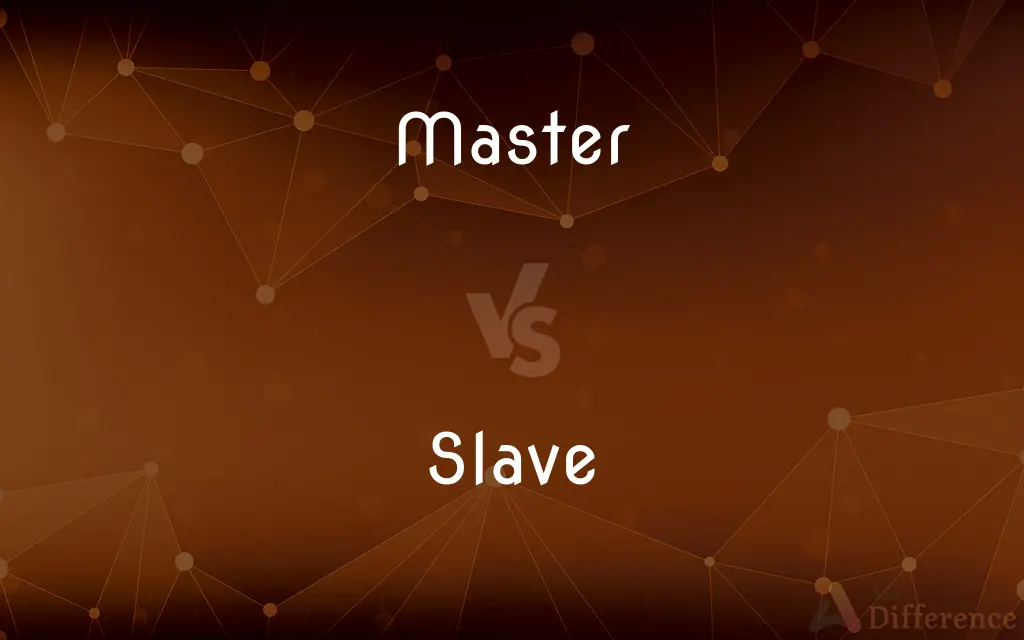Master vs. Slave — What's the Difference?
Edited by Tayyaba Rehman — By Fiza Rafique — Updated on September 27, 2023
"Master" refers to someone or something having authority, control, or superiority. "Slave" denotes someone or something subordinated, often forcibly, to the master's authority.

Difference Between Master and Slave
Table of Contents
ADVERTISEMENT
Key Differences
"Master" and "Slave" are terms with profound historical and sociological implications. In historical contexts, a master was an individual who owned and had control over slaves. Slaves, conversely, were individuals who were owned and controlled by the master, deprived of personal rights and freedom.
In technology, particularly computing, the terms "Master" and "Slave" describe a relationship between devices where one (the master) controls the operation, while the other (the slave) follows the master's instructions. This system's design ensures that the master sets the pace or provides commands, and the slave obeys or follows.
While "Master" often connotes expertise, proficiency, or authority in various fields like arts and crafts, "Slave" in broader contexts might indicate extreme dedication or subordination to a particular task or purpose. For example, an artist might be termed a "master" of his craft, while someone might be "a slave to fashion," indicating an overwhelming dedication to following fashion trends.
In everyday language, the term "Master" can simply refer to the owner or the person in charge, while "Slave" might denote someone or something that is controlled or dominated.
Comparison Chart
Historical Context
Individual who owned and controlled slaves.
Individuals owned and controlled by masters.
ADVERTISEMENT
Tech Context
Device or component controlling others.
Device or component controlled by the master.
Connotation
Authority, proficiency, or ownership.
Subordination, lack of freedom, or control.
Etymology
Derived from Old English "mǣgster", meaning "one having control or authority".
From Medieval Latin "sclavus", meaning "Slav".
Common Usage
Refers to expertise or the one in charge.
Indicates being controlled or dominated.
Compare with Definitions
Master
A person who has authority, control, or power over others.
He was the master of the household.
Slave
A person who is the legal property of another and is bound to absolute obedience.
The history book discussed the life of slaves in ancient civilizations.
Master
An expert or very skilled practitioner in a particular subject or activity.
She is a master of the piano.
Slave
A person who is excessively dependent upon or controlled by something.
He became a slave to his gambling addiction.
Master
The original of a document or recording from which copies can be made.
The studio lost the master tape of the album.
Slave
To work extremely hard.
She slaved away at her job, hoping for a promotion.
Master
A title for a young boy, not yet old enough to be called Mister.
Master Thomas was called to the front of the class.
Slave
One who is owned as the property of someone else, especially in involuntary servitude.
Master
The owner or keeper of an animal
The dog ran toward its master.
Slave
One who is subservient to or controlled by another
His boss's slave.
Master
The owner of a slave.
Slave
One who is subject to or controlled by a specified influence
A slave to alcohol.
A slave to an irrational fear.
Master
One who has control over or ownership of something
The master of a large tea plantation.
Slave
One who works extremely hard.
Master
An employer.
Slave
One who acts out the role of the submissive partner in a sadomasochistic relationship.
Master
The man who serves as the head of a household.
Slave
A slave ant.
Master
One who defeats another; a victor
I had to admit that I had met my master and so conceded the game.
Slave
A machine or component controlled by another machine or component.
Master
One who acts out the role of the dominating partner in a sadomasochistic relationship.
Slave
To work very hard or doggedly; toil.
Master
The captain of a merchant ship. Also called master mariner.
Slave
To trade in or transport slaves.
Master
One whose teachings or doctrines are accepted by followers.
Slave
To cause a machine or component to be controlled by another machine or component.
Master
Master(Christianity) Jesus.
Slave
A person who is held in servitude as the property of another person, and whose labor (and often also whose body and life) is subject to the owner's volition and control.
Master
A male teacher, schoolmaster, or tutor.
Slave
(figuratively) A drudge; one who labors or is obliged (e.g. by prior contract) to labor like a slave with limited rights, e.g. an indentured servant.
Master
One who holds a master's degree.
Slave
(figuratively) An abject person.
Master
An artist or performer of great and exemplary skill.
Slave
(figuratively) One who has no power of resistance (to something), one who surrenders to or is under the domination (of something).
A slave to passion, to strong drink, or to ambition
Master
An old master.
Slave
(BDSM) A submissive partner in a BDSM relationship who (consensually) submits to (sexually and/or personally) serving one or more masters or mistresses.
Master
A worker qualified to teach apprentices and carry on the craft independently.
Slave
A sex slave, a person who is forced against their will to perform, for another person or group, sexual acts on a regular or continuing basis.
Master
An expert
A master of three languages.
Slave
A device (such as a secondary flash or hard drive) that is subject to the control of another (a master).
Master
Used formerly as a title for a man holding a naval office ranking next below a lieutenant on a warship.
Slave
To work as a slaver, to enslave people.
Master
Used as a title for a man who serves as the head or presiding officer of certain societies, clubs, orders, or institutions.
Slave
(intransitive) To work hard.
I was slaving all day over a hot stove.
Master
Master Used as a title for any of various male officers having specified duties concerning the management of the British royal household.
Slave
(transitive) To place a device under the control of another.
To slave a hard disk
Master
Master Used as a courtesy title before the given or full name of a boy not considered old enough to be addressed as Mister.
Slave
See Slav.
Master
(Archaic) Used as a form of address for a man; mister.
Slave
A person who is held in bondage to another; one who is wholly subject to the will of another; one who is held as a chattel; one who has no freedom of action, but whose person and services are wholly under the control of another.
Art thou our slave,Our captive, at the public mill our drudge?
Master
One who is appointed to assist a court in the performance of certain legal functions, such as the taking of testimony and calculating damages in complex litigation. Also called special master.
Slave
One who has lost the power of resistance; one who surrenders himself to any power whatever; as, a slave to passion, to lust, to strong drink, to ambition.
Master
Master A man who owns a pack of hounds or is the chief officer of a hunt.
Slave
A drudge; one who labors like a slave.
Master
An original, such as an original document or audio recording, from which copies can be made.
Slave
An abject person; a wretch.
Master
Of, relating to, or characteristic of a master.
Slave
To drudge; to toil; to labor as a slave.
Master
Principal or predominant
A master plot.
Slave
To enslave.
Master
Controlling all other parts of a mechanism
A master switch.
Slave
A person who is owned by someone
Master
Highly skilled or proficient
A master thief.
Slave
Someone who works as hard as a slave
Master
Being an original from which copies are made.
Slave
Someone entirely dominated by some influence or person;
A slave to fashion
A slave to cocaine
His mother was his abject slave
Master
To become very skilled in or knowledgeable about
Mastered the language in a year's study.
Slave
Work very hard, like a slave
Master
To overcome or defeat
He finally mastered his addiction to drugs.
Slave
Held in servitude;
He was born of slave parents
Master
To produce a master copy of (an audio or video recording, for example).
Slave
A device, or part of one, directly controlled by another.
The printer acts as a slave to the computer.
Master
Someone who has control over something or someone.
Slave
A secondary reflection in a sextant or other instrument.
The navigator adjusted the slave mirror.
Master
The owner of an animal or slave.
Master
(nautical) The captain of a merchant ship; a master mariner.
Master
(dated) The head of a household.
Master
Someone who employs others.
Master
An expert at something.
Mark Twain was a master of fiction.
Master
A tradesman who is qualified to teach apprentices.
Master
(dated) A schoolmaster.
Master
A skilled artist.
Master
(dated) A man or a boy; mister. See Master.
Master
A master's degree; a type of postgraduate degree, usually undertaken after a bachelor degree.
She has a master in psychology.
Master
A person holding such a degree.
He is a master of marine biology.
Master
The original of a document or of a recording.
The band couldn't find the master, so they re-recorded their tracks.
Master
(film) The primary wide shot of a scene, into which the closeups will be edited later.
Master
(legal) A parajudicial officer (such as a referee, an auditor, an examiner, or an assessor) specially appointed to help a court with its proceedings.
The case was tried by a master, who concluded that the plaintiffs were the equitable owners of the property....
Master
A device that is controlling other devices or is an authoritative source.
A master wheel
A master database
Master
(freemasonry) A person holding an office of authority, especially the presiding officer.
Master
(by extension) A person holding a similar office in other civic societies.
Master
(BDSM) A male dominant.
Master
A vessel having a specified number of masts.
A two-master
Master
Masterful.
A master performance
Master
Main, principal or predominant.
Master
Highly skilled.
Master batsman
Master
Original.
Master copy
Master
(intransitive) To be a master.highly ambiguous, master in what sense?
Master
(transitive) To become the master of; to subject to one's will, control, or authority; to conquer; to overpower; to subdue.
Master
(transitive) To learn to a high degree of proficiency.
It took her years to master the art of needlecraft.
Master
To own; to possess.
Master
To make a master copy of.
Master
To earn a Master's degree.
He mastered in English at the state college.
Master
A vessel having (so many) masts; - used only in compounds; as, a two-master.
Master
A male person having another living being so far subject to his will, that he can, in the main, control his or its actions; - formerly used with much more extensive application than now.
Master
One who uses, or controls at will, anything inanimate; as, to be master of one's time.
Master of a hundred thousand drachms.
We are masters of the sea.
Master
One who has attained great skill in the use or application of anything; as, a master of oratorical art.
Great masters of ridicule.
No care is taken to improve young men in their own language, that they may thoroughly understand and be masters of it.
Master
A title given by courtesy, now commonly pronounced mĭster, except when given to boys; - sometimes written Mister, but usually abbreviated to Mr.
Master
A young gentleman; a lad, or small boy.
Where there are little masters and misses in a house, they are impediments to the diversions of the servants.
Master
The commander of a merchant vessel; - usually called captain. Also, a commissioned officer in the navy ranking next above ensign and below lieutenant; formerly, an officer on a man-of-war who had immediate charge, under the commander, of sailing the vessel.
Master
A person holding an office of authority among the Freemasons, esp. the presiding officer; also, a person holding a similar office in other civic societies.
Throughout the city by the master gate.
Master
To become the master of; to subject to one's will, control, or authority; to conquer; to overpower; to subdue.
Obstinacy and willful neglects must be mastered, even though it cost blows.
Master
To gain the command of, so as to understand or apply; to become an adept in; as, to master a science.
Master
To own; to posses.
The wealthThat the world masters.
Master
To be skillful; to excel.
Master
An artist of consummate skill;
A master of the violin
One of the old masters
Master
A person who has general authority over others
Master
A combatant who is able to defeat rivals
Master
Directs the work of other
Master
Presiding officer of a school
Master
An original creation (i.e., an audio recording) from which copies can be made
Master
An officer who is licensed to command a merchant ship
Master
Someone who holds a master's degree from academic institution
Master
An authority qualified to teach apprentices
Master
Key that secures entrance everywhere
Master
Be or become completely proficient or skilled in;
She mastered Japanese in less than two years
Master
Get on top of; deal with successfully;
He overcame his shyness
Master
Have dominance or the power to defeat over;
Her pain completely mastered her
The methods can master the problems
Master
Have a firm understanding or knowledge of; be on top of;
Do you control these data?
Master
A device or part of a machine controlling the operation of other mechanisms.
The master clock controls all the other clocks in the building.
Common Curiosities
Is the master always superior in every context?
Generally, "master" indicates superiority or authority, but context is key.
In technology, does the slave device operate independently?
No, a slave device typically operates under the control of the master device.
Is "masterpiece" related to the term "Master"?
Yes, it denotes a work of outstanding artistry, skill, or workmanship by a master.
Can "Slave" mean being controlled by an addiction or habit?
Yes, it can indicate being "enslaved" or controlled by a particular thing or habit.
Were slaves only found in the U.S. historically?
No, slavery existed in many cultures and regions throughout history.
Are "Master" and "Slave" always related to historical slavery?
No, they can also refer to relationships in technology, hierarchy, or expertise.
Can "Master" refer to a degree in education?
Yes, like a Master's Degree, indicating advanced study or proficiency.
Can "Slave" also be a verb?
Yes, like "to slave away", meaning to work extremely hard.
Are the terms "Master" and "Slave" universally understood?
While widely recognized, their specific meanings can vary by context and culture.
Is using "Master" and "Slave" in tech contexts considered controversial?
Yes, due to historical connotations, some prefer alternative terms like "primary" and "secondary".
Was the term "Slave" derived from a reference to the Slavs?
Yes, "slave" comes from Medieval Latin "sclavus", referring to the Slavs, who were often enslaved.
Should we be cautious using "Master" and "Slave" due to sensitive connotations?
Yes, especially in personal or cultural contexts, it's crucial to approach with sensitivity.
What's a "Master key"?
A key designed to open multiple locks in a set, whereas other keys open only one.
Is "mastermind" related to the term "Master"?
Yes, it refers to a person with outstanding intellect or the main person responsible for something.
Can "Slave" refer to a reflection or part in an instrument?
Yes, like in a sextant where it's a secondary reflection.
Share Your Discovery

Previous Comparison
Fructooligosaccharide vs. Oligofructose
Next Comparison
Alcohol vs. GlycerolAuthor Spotlight
Written by
Fiza RafiqueFiza Rafique is a skilled content writer at AskDifference.com, where she meticulously refines and enhances written pieces. Drawing from her vast editorial expertise, Fiza ensures clarity, accuracy, and precision in every article. Passionate about language, she continually seeks to elevate the quality of content for readers worldwide.
Edited by
Tayyaba RehmanTayyaba Rehman is a distinguished writer, currently serving as a primary contributor to askdifference.com. As a researcher in semantics and etymology, Tayyaba's passion for the complexity of languages and their distinctions has found a perfect home on the platform. Tayyaba delves into the intricacies of language, distinguishing between commonly confused words and phrases, thereby providing clarity for readers worldwide.
















































